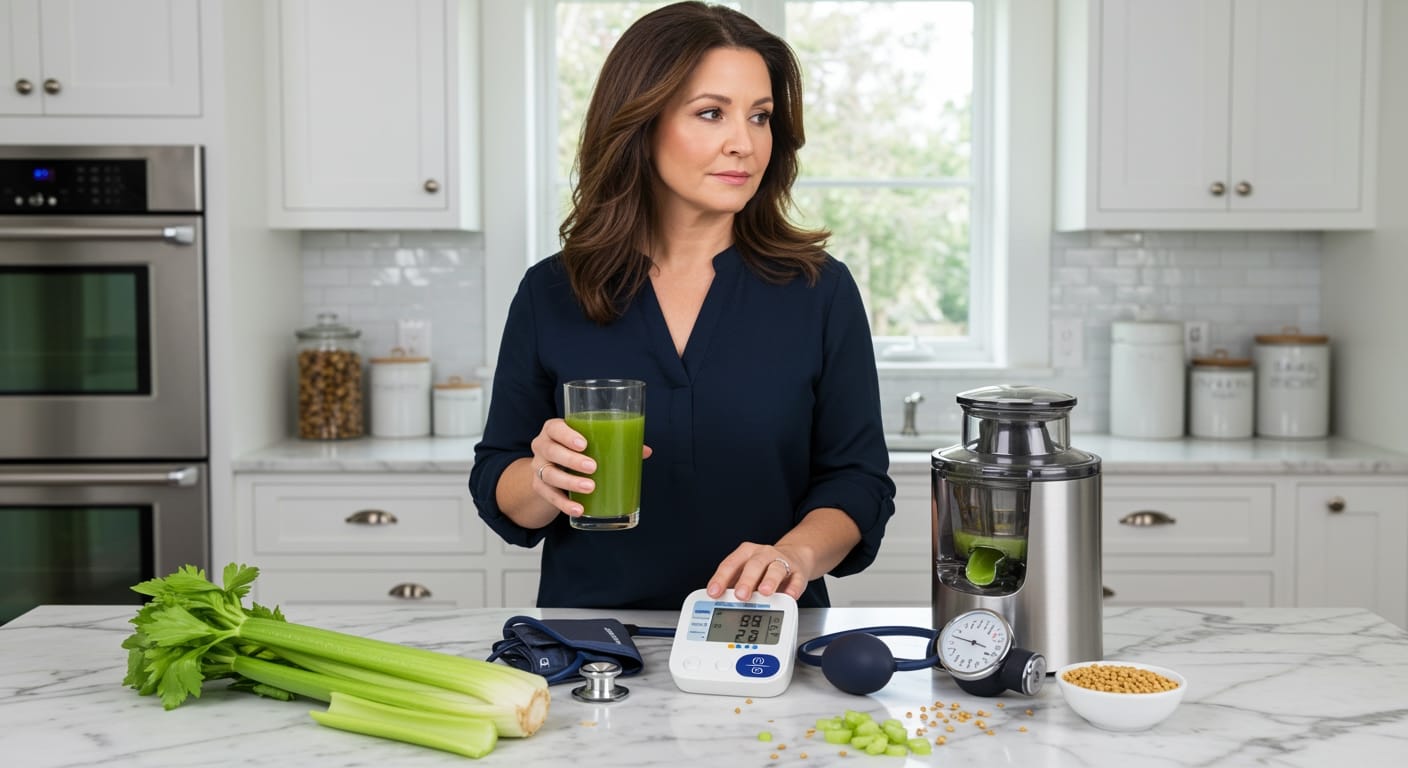✪ Key Takeaway: Celery juice may provide modest blood pressure benefits due to natural compounds, but evidence remains limited.
Introduction
Social media influencers claim celery juice can cure high blood pressure overnight.
You might be wondering if this green drink can replace your blood pressure medication or provide real cardiovascular benefits.
Hi, I’m Abdur, your nutrition coach and today I’m going to explain the science behind celery juice and its actual effects on blood pressure control.
What compounds in celery juice affect blood pressure?
Celery contains several bioactive compounds that may influence cardiovascular health.
The most important compound is 3-n-butylphthalide, which gives celery its distinctive smell and taste.
This compound works by relaxing smooth muscle cells in blood vessel walls.
When these muscles relax, your blood vessels dilate and allow blood to flow more easily.
Celery also contains potassium, which helps your kidneys excrete excess sodium through urine.
Lower sodium levels reduce the amount of fluid your body retains, which decreases the pressure on your blood vessel walls.
✪ Fact: One cup of celery juice contains about 614 milligrams of potassium, roughly 13% of your daily needs.
Does research support celery juice for blood pressure?
Most studies on celery and blood pressure used celery seed extract, not fresh celery juice.
A small study found that celery seed extract reduced blood pressure in people with mild hypertension.
However, the extract contained concentrated amounts of active compounds that you cannot get from drinking celery juice.
Animal studies show promising results, but human research remains extremely limited.
The few human studies available used small sample sizes and short durations.
No large-scale clinical trials have proven that drinking celery juice significantly lowers blood pressure in humans.
✪ Note: Most celery juice health claims come from testimonials rather than peer-reviewed scientific evidence.
How much celery juice would you need for blood pressure effects?
The effective dose of celery compounds for blood pressure benefits remains unknown.
Studies that showed positive results used standardized extracts with specific concentrations of active compounds.
Fresh celery juice contains much lower concentrations of these beneficial compounds compared to extracts.
You would likely need to drink several cups of celery juice daily to match the doses used in research studies.
This amount could cause digestive issues and provide excessive sodium for some people.
The high water content in celery juice also means you would need to consume large volumes to get meaningful amounts of active compounds.
✪ Pro Tip: Focus on whole celery stalks as snacks rather than large amounts of juice for better nutrient balance.
What are the risks of relying on celery juice for blood pressure?
High blood pressure is a serious medical condition that requires proven treatments.
Delaying or avoiding medical treatment while trying celery juice could lead to heart attack, stroke, or kidney damage.
Celery juice also contains natural sodium, which can raise blood pressure in salt-sensitive individuals.
Some people experience allergic reactions to celery, including skin rashes and breathing difficulties.
The high potassium content could be dangerous for people with kidney disease or those taking certain medications.
Always consult your doctor before using celery juice as a blood pressure remedy, especially if you take prescription medications.
✪ Note: Never stop taking prescribed blood pressure medications without medical supervision.
The Bottom Line
Celery juice may provide modest blood pressure benefits due to its natural compounds, but the evidence remains weak and inconclusive.
Real health improvements come from proven strategies, not trendy quick fixes.
I would love to hear your thoughts about celery juice and blood pressure in the comments below, and feel free to share any questions you might have about natural approaches to cardiovascular health.
References
At NutritionCrown, we use quality and credible sources to ensure our content is accurate and trustworthy. Below are the sources referenced in creating this article:
- PMC: Celery and Blood Pressure Research
- Journal of the American College of Cardiology: Cardiovascular Health Guidelines
- Frontiers in Nutrition: Dietary Approaches to Blood Pressure
- Health.gov: Dietary Guidelines Scientific Report





